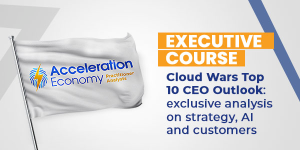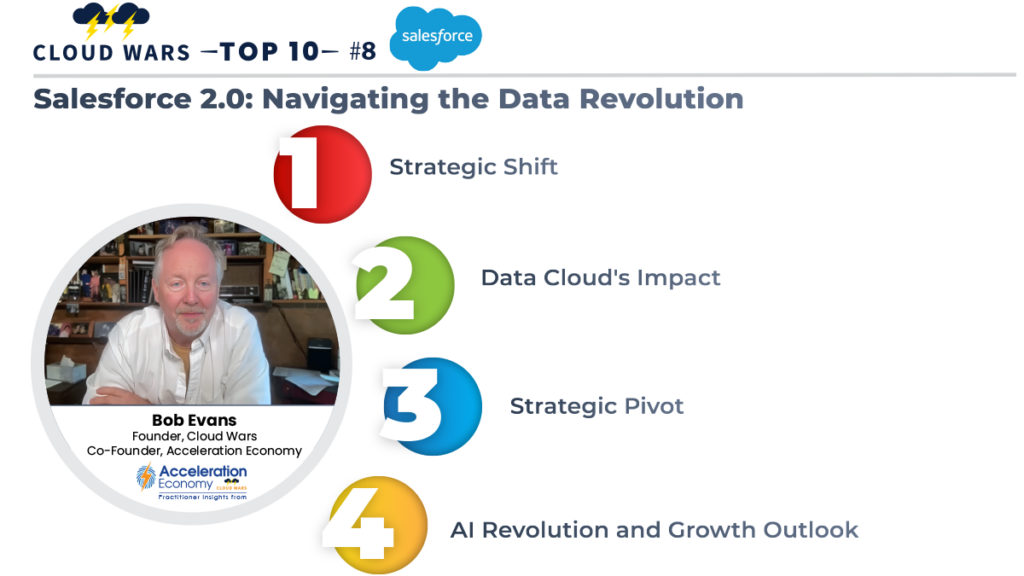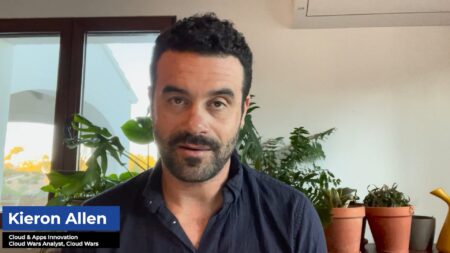
As growth projections for Salesforce’s core business tumble into single digits, while the AI Revolution intensifies, CEO Marc Benioff is unleashing Salesforce 2.0 by declaring that the world’s largest enterprise applications vendor has become a data company.
Or perhaps Benioff believes that Salesforce has long been a data company and that in the Cloud & AI Wars here in 2024 it is finally time to loudly and proudly declare that status with the red-hot Data Cloud as the new superstar in the Salesforce galaxy.
“We are a data company — we operate at the data level,” Benioff said in a long and fascinating comment during the company’s Feb. 28 earnings call.
“We’re about customer success made possible by data. This is the AI Revolution, and it’s a data revolution — there’s no question about that.
“You cannot have the AI without the data.”
Okay — that all makes perfect sense. In fact, former Snowflake CEO Frank Slootman, whose company pioneered the Data Cloud concept, has been trumpeting that very same message — “There is no AI strategy without a data strategy” — for more than a year.
But the difference is that while Snowflake was born as a data company, Salesforce has always been an applications company — and while every apps company is inescapably tied to data, does that linkage make them data companies?
Is Benioff an outlier here in saying that Salesforce has some unique technologies and capabilities that allow it to seamlessly bridge the gap from apps to data?
Or is he saying something much bigger and broader and more disruptive: that here in the AI Revolution, all apps companies are by definition becoming data companies?
And remember — Salesforce is not just some fairly successful apps vendor, and Marc Benioff is not just another CEO of another software company. No, this will be more far-reaching because Salesforce is the world’s largest enterprise-apps company, and Benioff has created an extremely high-visibility profile for himself as not just the CEO of Salesforce but as a global visionary whose impact transcends technology and touches everything from consumer behavior to public policy to politics.
So when Benioff proclaims that Salesforce’s real and true identity here at the dawn of the AI Revolution is that of a data company, that’s not an isolated incident. I suspect that every enterprise-apps company CEO is meeting with his/her teams this week to discuss a question that’s certainly strategic and might be existential: are we an apps company or a data company? Can we be both? And what position will be most advantageous for our customers?
Salesforce’s Red-Hot Data Cloud
When he truly warms to his subject, Marc Benioff is a darn good orator — one of the best this industry has ever seen. And on Salesforce’s Feb. 28 fiscal-Q4 earnings call, he was particularly energized about not just the data-company metamorphosis but also the factors driving it, particularly the Salesforce Data Cloud.
Calling the Data Cloud “the fastest-growing organic product in the history of Salesforce,” Benioff said on the earnings call that “we’re seeing incredible demand for Data Cloud” because “it pulls everything together.”
Salesforce said its Data Cloud is approaching an annualized run rate of $400 million and is growing at about 88% year over year.
Benioff even seemed to hint at something like manifest destiny when he noted that “we are so blessed to have Data Cloud in our company,” which has recently added 1,000 new customers and was included in 25% of Q4 deals of $1 million or more.
“We’ve never seen traction like this with a new product because you can just easily turn on the Data Cloud, and it adds huge value to Sales Cloud, it adds huge value to Service Cloud, to Marketing Cloud, and to the CDP [Customer Data Platform],” Benioff said.
And speaking of those former superstars Sales Cloud, Service Cloud, and Marketing Cloud: I got the impression from some of Benioff’s commentary that he’s expecting Data Cloud to supply some form of regenerative “fountain of youth” (my words, not his) energy to those legacy apps as their growth rates tumbled into single digits.
When president and CFO Amy Weaver offered guidance for fiscal 2025 (Feb. 1 to Jan. 31), she said companywide growth would be 8% to 9% on projected revenue of $37.7 billion to $38 billion. And while Weaver said that within those overall numbers, subscription and support revenue “is expected to be slightly above 10% year over year in constant currency,” the reality of an iconic software company that can no longer grow even in low double digits must be disturbing to Benioff.
And particularly because of his effusive commentary about the size and scope of the AI Revolution: “That’s why every CEO and company knows they need to make major investments in AI right now,” Benioff said on the call.
“And I believe this is the single most important moment in the history of the technology industry. It’s giving companies an unprecedented level of intelligence that will allow them to connect with their customers in a whole new way. And with our Einstein 1 Platform, we’re helping out our customers transform for the AI future.”
Pretty bullish outlook, isn’t it?
Yet, in spite of this being “the single most important moment in the history of the technology industry,” Marc Benioff’s company is going to grow only 8% or 9% in the coming year and in the midst of that “single most important moment in the history of the technology industry”?
Final Thought
No, that just doesn’t compute.
And clearly Benioff recognizes that.
And that’s why, as growth opportunities for his legacy business spiral downward into single digits for the first time in the storied 25-year history of his company, Benioff has decided to unleash Salesforce 2.0: “We are a data company.”
One thing we can be sure of: In the incredibly rigorous competition of the Cloud Wars, it won’t take too long to see if customers agree with Benioff’s new position for what is now the world’s largest enterprise-apps company.

Register for Acceleration Economy’s Cloud Wars CEO Outlook 2024 Course, now available. Featuring exclusive interviews on strategy, AI, and customers with the CEOs of Cloud Wars Top 10 companies.









